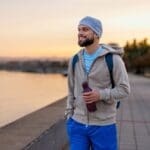Let’s think about fences. For our purposes here, let’s think specifically about a fence that surrounds your yard. That fence—whether picket or chain link or what have you—keeps some things in and some other things out.
For example, the fence around your yard can make it safe for your dog to go outside without a leash. At the same time, that fence would keep your neighbor’s dog off your property if that pooch happened to escape from their own yard. You can probably think of several other situations in which a fence would keep something in or something out.
How does this relate to recovery from a substance use disorder? Well, we might argue that a person in recovery can benefit from building some metaphorical fences. To put it another way, setting boundaries can serve a person well in recovery.
Let’s look at three situations in which boundaries can help you keep your hard-won recovery intact.
Set Boundaries Around What Is in Your Home
Many people in recovery from a substance use disorder live with people who are not in recovery. One spouse might be in recovery while the other is not. A roommate might be in recovery while others in the home are not. In cases like these, the person in recovery may have to set some boundaries that impact others in the household.
For example, if you are in recovery from a substance use disorder centered on alcohol, it may well be the case that you can’t have alcohol in your living space. After all, a strong craving for and easy access to alcohol is a terrible combination.
It is important to be honest with others about what puts your recovery at risk—and it is important to hear their point of view as well. In some cases, a compromise might be necessary. For example, someone in your household might feel they have a right to have alcohol at home, but they might be willing to keep it in a lockable refrigerator to which you do not have access. Every situation will be different, but it is still valid to set a boundary that works for you.
Set Boundaries Around Who You Will Hang Out With
Plenty of people use drugs or alcohol with a group of friends or acquaintances. When a person finishes treatment and starts their recovery journey, hanging out with those people who are still using one substance or another is a bad idea.
That means you have to set a boundary around your social life. You want to build a strong network of family and friends who are supportive of your recovery and willing to see you through difficult moments.
You will always want to set boundaries when it comes to individuals who tear you down rather than build you up. These people might never have used drugs or alcohol in their lives, but they can still undermine your recovery by chipping away at your self-esteem with judgmental comments or snide remarks. You need supportive voices in your ear in recovery (those supportive voices should include your own).
Set Boundaries Around Your Time
When you get out of treatment and return to your regular life, you might find yourself throwing yourself into your work—especially if the quality of your work suffered due to drug or alcohol use. Working hard, of course, is a fine thing to do. A fine thing to do, that is, unless it leads to unsustainable levels of stress.
Stress can be the enemy of your recovery, and stress can really build up if you do not set boundaries around your time. That includes taking regular breaks during your weekday, protecting your downtime in the evening and on weekends, and actually taking vacations. It means using your time away from work to relax and recharge. That might include engaging with a hobby, spending time with the sorts of supportive friends we talked about above, and getting regular sleep. All of those things can help protect your recovery.
We should also note that work can become a substitute addiction—standing in for drugs or alcohol and causing significant problems that can eventually upend your recovery and send you into relapse. Having a healthy relationship with your work is a key part of recovery.
We Can Help You Get Your Recovery Journey Underway
Located near St. Louis, Missouri, The Aviary Recovery Center provides evidence-based, personalized treatment programs for individuals struggling with a substance use disorder. We also offer treatment for co-occurring mental health disorders that may be entangled with your drug or alcohol use. You can count on our expertise, experience, and empathy as we see you through medically supervised detoxification and a rehabilitation program designed to prepare you for the challenges of recovery.
The Aviary Recovery Center is consistently recognized as one of the top substance use disorder treatment facilities in the country. We are ready to provide that top-notch care to you so that you can reclaim and rebuild your life free from the devastating influence of drugs or alcohol.










